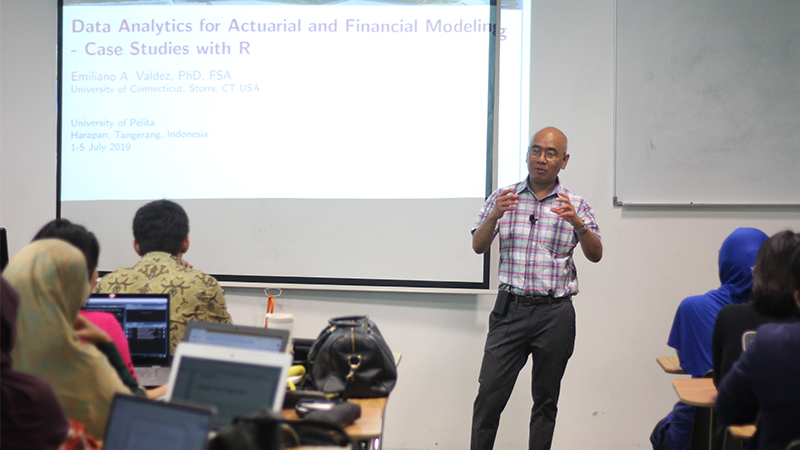2019
UPH – READI Project Equips Indonesia’s Actuarial Professors with ‘Predictive Analytics’ Short Course.

UPH’s Mathematics Study Program, as part of the Human Resources (SDM) development program in the Actuarial major in the project called READI (Risk Management, Economic Sustainability, and Actuarial Science Development in Indonesia), is again the host of Short Course for Actuarial professors. This event was held at UPH Campus Lippo Village from 1 to 5 July 2019. The 12th annual Short Course invited Prof. Emiliano A. Valdez, Ph.D., FSA – Professor of Actuarial Science from University of Connecticut, USA. Prof. Valdez is also the writer of the book titled “Actuarial Statistics with R”. This book is the main reference for several exams in the Actuarial and Society of Actuary (SoA) profession.
After the opening by UPH Chancellor Dr. (Hon) Jonathan L. Parapak, M.Eng.Sc., the event was continued by a training session participated by over 50 professors from universities all over Indonesia, such as IPB, ITS, Universitas Prasetya Mulya, Universitas Gadjah Mada, and so on.
The topic Predictive Analytics was chosen due to the development of big data and the development of the current Industrial Revolution trend that needs data analysis in decision making. Through this short course, it is expected that the instructors will become more equipped and will be able to share the most recent knowledge to their students.
William James Duggan, READI Project Field Director, Indonesia, explained, “This short course was made to equip professors with Mathematics and Statistics background, but who have not experienced specific skills in actuary. One of these skills is called predictive analytics, which is classified as a new skill and is closely related to big data and the 4.0 industry.”
In the short course, Prof. Valdez simply explained the meaning of Predictive Analytics, “Predictive Analytics is the way to manage data in order to predict something. This will take into account the risks, result, impact, and other factors in order to see the financial impact. In this Short Course, we will discuss specific tools in order to help you do predictive analytics. We will start with the most important theory then continue to the implementation of the analysis through actual cases. We will analyze these case studies using R. R is one of the programming tools used to analyze data.”
In line with Duggan, Prof. Valdez also explained that the development of the big data era is why an understanding of predictive analytics is important. An actuary must not only get the right data in order to decide; they must also use the data and compact it into statistics. Managing the data through statistics is the foundation in making the right decision. Therefore, a bunch of big data can be processed into something meaningful. Then, from this big data, it can be classified into smaller and smaller classes in order to use it at the right time.
In response to the short course, Dr. Helena Margaretha – Coordinator of Actuarial and Mathematical Business, from the Science and Technology Faculty of UPH – sees this program in a positive light.
She said, “This short course will equip the actuarial professors so that we will always be up-to-date with developments. The concept of big data and the 4.0 industrial revolution is just starting to develop, making it imperative that we understand it deeply. We will not only understand concepts from the 90s, but we will strive to widen our knowledge through current trends. At UPH, Predictive Analytics is now taught in several courses. However, we expect that we will open a new course that focuses on Predictive Analysis in the future. Currently, we have three professors who have continued their Actuarial studies at the University of Waterloo, Canada. This will strengthen our teaching quality in Actuarial Sciences and Predictive Analytics.”
Dr. Margaretha also observed that by being the host, it is proven that UPH is always following the developments and the trends so that the students receive up-to-date knowledge.
At the end of the short course, the participants received certificates. The short course also helped in preparing participants who are taking the Persatuan Aktuaris Indonesia (PAI) exam.



